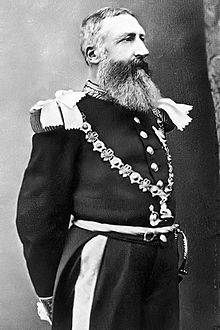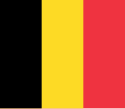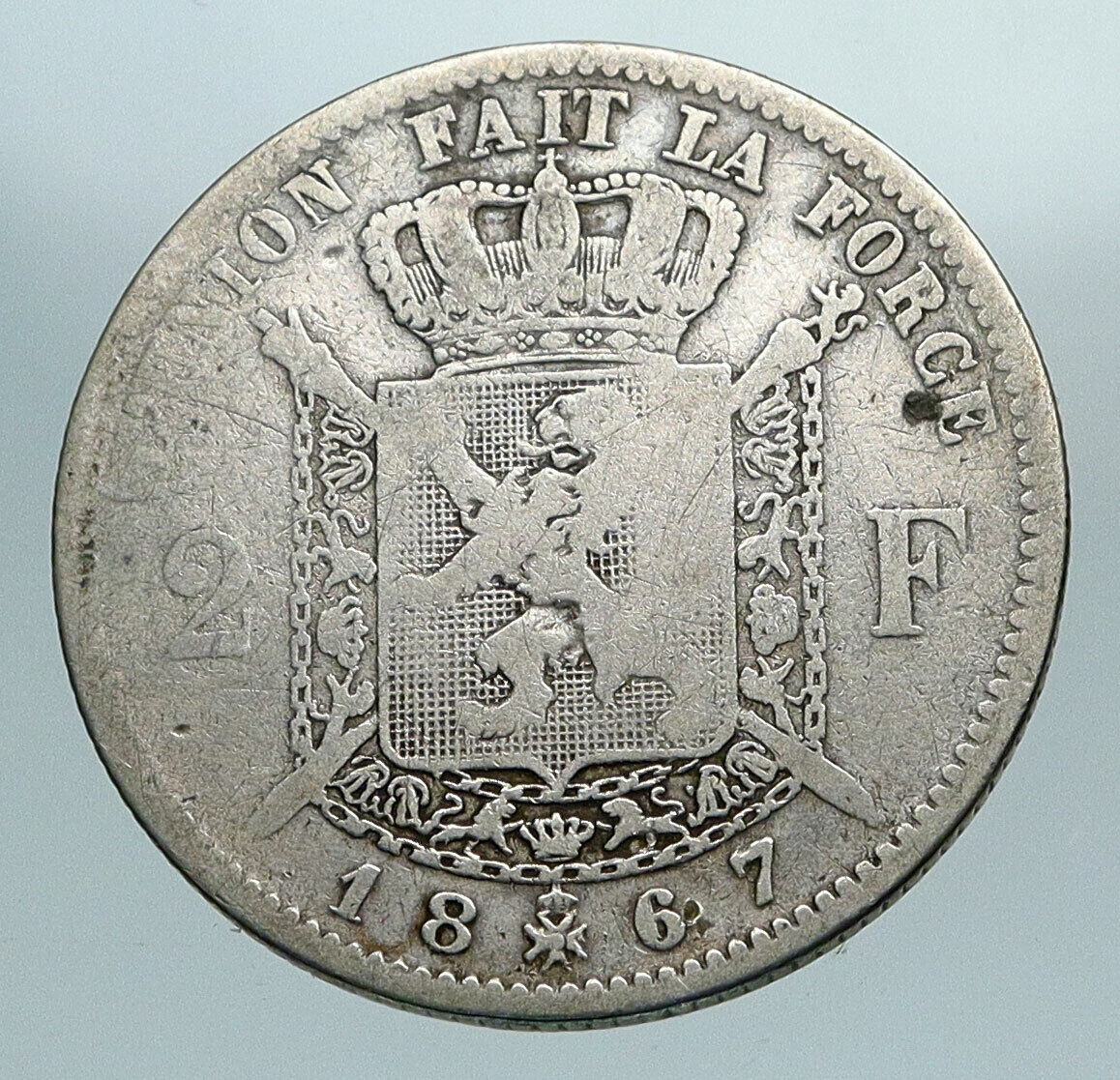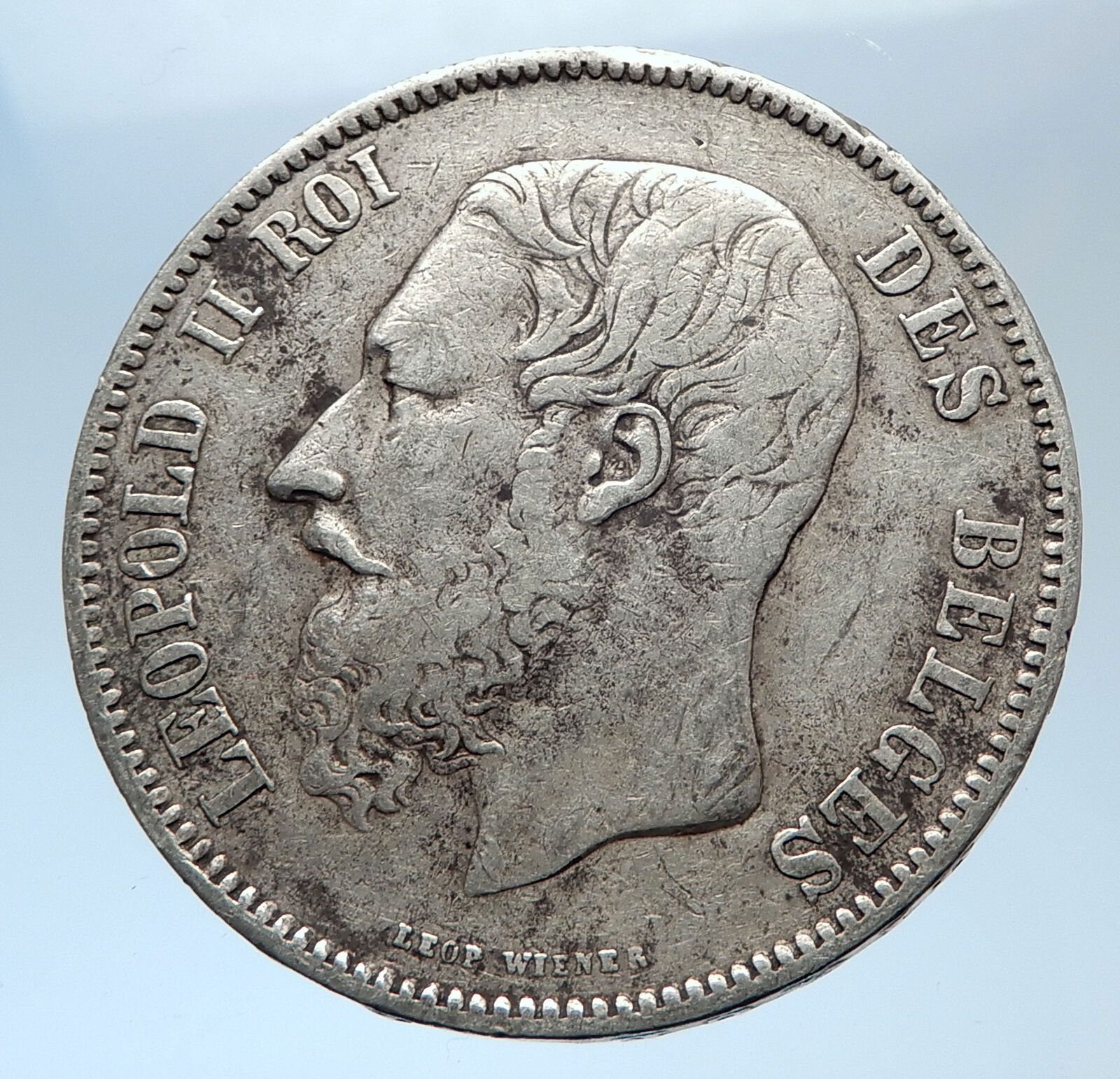|
Belgium under Leopold II – King: 17 December 1865 – 17 December 1909
1876 Silver 5 Francs 37mm (24.80 grams) 0.900 Silver (0.7234 oz. ASW)
Reference: KM# 24 | Engraver: Leopold Wiener
LEOPOLD II ROI DES BELGES, Head of Leopold II of Belgium surrounded with the legend in French; LEOP WIENER (designer’s name) below.
L’UNION FAIT LA FORCE (motto translation: UNITY MAKES STRENGTH) around crowned shield decorated with lion within wreath with 5-F across fields; year below.
You are bidding on the exact item pictured, provided with a Certificate of Authenticity and Lifetime Guarantee of Authenticity.
 Leopold II (9 April 1835 – 17 December 1909) reigned as the second King of the Belgians from 1865 to 1909 and became known for the founding and exploitation of the Congo Free State as a private venture. Leopold II (9 April 1835 – 17 December 1909) reigned as the second King of the Belgians from 1865 to 1909 and became known for the founding and exploitation of the Congo Free State as a private venture.
Born in Brussels as the second (but eldest surviving) son of Leopold I and Louise of Orléans, he succeeded his father to the Belgian throne in 1865 and reigned for forty-four years until his death – the longest reign of any Belgian monarch. He died without surviving male issue and the current Belgian king descends from his nephew and successor, Albert I.
Leopold became the founder and sole owner of the Congo Free State, a private project undertaken on his own behalf. He used explorer Henry Morton Stanley to help him lay claim to the Congo, the present-day Democratic Republic of the Congo. At the Berlin Conference of 1884-1885 the colonial nations of Europe authorized his claim by committing the Congo Free State to improving the lives of the native inhabitants. From the beginning, however, Leopold essentially ignored these conditions. He ran the Congo using the mercenary Force Publique for his personal enrichment. He used great sums of the money from this exploitation for public and private construction projects in Belgium during this period. He donated the private buildings to the state before his death, to preserve them for Belgium.
Under his regime millions of the Congolese people died: modern estimates range from one million to fifteen million, with a consensus growing around 10 million. Human-rights abuses under his régime contributed significantly to these deaths. Reports of deaths and abuse led to a major international scandal in the early twentieth century and the Belgian government ultimately forced Leopold to relinquish control of the colony to Belgian civil administration in 1908.
Belgium, officially the Kingdom of Belgium, is a sovereign state in Western Europe. It is a small, densely populated country which covers an area of 30,528 square kilometres (11,787 sq mi) and has a population of about 11 million people.
 Straddling the cultural boundary between Germanic and Latin Europe, Belgium is home to two main linguistic groups: the Dutch-speaking, mostly Flemish community, which constitutes about 59% of the population, and the French-speaking, mostly Walloon population, which comprises 41% of all Belgians. Additionally, there is a small group of German-speakers who live in the East Cantons located around the High Fens area, and bordering Germany. Straddling the cultural boundary between Germanic and Latin Europe, Belgium is home to two main linguistic groups: the Dutch-speaking, mostly Flemish community, which constitutes about 59% of the population, and the French-speaking, mostly Walloon population, which comprises 41% of all Belgians. Additionally, there is a small group of German-speakers who live in the East Cantons located around the High Fens area, and bordering Germany.
 Belgium is a federal constitutional monarchy with a parliamentary system of governance. It is divided into three regions and three communities, that exist next to each other. Its two largest regions are the Dutch-speaking region of Flanders in the north and the French-speaking southern region of Wallonia. The Brussels-Capital Region, officially bilingual, is a mostly French-speaking enclave within the Flemish Region. A German-speaking Community exists in eastern Wallonia. Belgium’s linguistic diversity and related political conflicts are reflected in its political history and complex system of government. Belgium is a federal constitutional monarchy with a parliamentary system of governance. It is divided into three regions and three communities, that exist next to each other. Its two largest regions are the Dutch-speaking region of Flanders in the north and the French-speaking southern region of Wallonia. The Brussels-Capital Region, officially bilingual, is a mostly French-speaking enclave within the Flemish Region. A German-speaking Community exists in eastern Wallonia. Belgium’s linguistic diversity and related political conflicts are reflected in its political history and complex system of government.
 Historically, Belgium, the Netherlands and Luxembourg were known as the Low Countries; it once covered a somewhat larger area than the current Benelux group of states. The region was called Belgica in Latin, after the Roman province of Gallia Belgica. From the end of the Middle Ages until the 17th century, the area of Belgium was a prosperous and cosmopolitan centre of commerce and culture. From the 16th century until the Belgian Revolution in 1830, when Belgium seceded from the Netherlands, the area of Belgium served as the battleground between many European powers, causing it to be dubbed the “Battlefield of Europe,” a reputation strengthened by both world wars. Historically, Belgium, the Netherlands and Luxembourg were known as the Low Countries; it once covered a somewhat larger area than the current Benelux group of states. The region was called Belgica in Latin, after the Roman province of Gallia Belgica. From the end of the Middle Ages until the 17th century, the area of Belgium was a prosperous and cosmopolitan centre of commerce and culture. From the 16th century until the Belgian Revolution in 1830, when Belgium seceded from the Netherlands, the area of Belgium served as the battleground between many European powers, causing it to be dubbed the “Battlefield of Europe,” a reputation strengthened by both world wars.
Upon its independence, Belgium participated in the Industrial Revolution and, during the course of the 20th century, possessed a number of colonies in Africa. The second half of the 20th century was marked by rising tensions between the Dutch-speaking and the French-speaking citizens fueled by differences in language and the unequal economic development of Flanders and Wallonia. This continuing antagonism has led to several far-reaching reforms, resulting in a transition from a unitary to a federal arrangement during the period from 1970 to 1993. Despite the reforms, tensions between the groups remain; the formation of a coalition government took 18 months following the June 2010 federal election.
Belgium is a founding member of the European Union, Eurozone, NATO, OECD and WTO, and a part of the trilateral Benelux Union. Its capital, Brussels, hosts several of the EU’s official seats as well as the headquarters of many major international organizations such as NATO. Belgium is also a part of the Schengen Area.
Belgium is a developed country, with an advanced high-income economy and is categorized as “very high” in the Human Development Index.
|





 Leopold II (9 April 1835 – 17 December 1909) reigned as the second King of the Belgians from 1865 to 1909 and became known for the founding and exploitation of the Congo Free State as a private venture.
Leopold II (9 April 1835 – 17 December 1909) reigned as the second King of the Belgians from 1865 to 1909 and became known for the founding and exploitation of the Congo Free State as a private venture. Straddling the cultural boundary between Germanic and Latin Europe, Belgium is home to two main linguistic groups: the Dutch-speaking, mostly Flemish community, which constitutes about 59% of the population, and the French-speaking, mostly Walloon population, which comprises 41% of all Belgians. Additionally, there is a small group of German-speakers who live in the East Cantons located around the High Fens area, and bordering Germany.
Straddling the cultural boundary between Germanic and Latin Europe, Belgium is home to two main linguistic groups: the Dutch-speaking, mostly Flemish community, which constitutes about 59% of the population, and the French-speaking, mostly Walloon population, which comprises 41% of all Belgians. Additionally, there is a small group of German-speakers who live in the East Cantons located around the High Fens area, and bordering Germany. Belgium is a federal constitutional monarchy with a parliamentary system of governance. It is divided into three regions and three communities, that exist next to each other. Its two largest regions are the Dutch-speaking region of Flanders in the north and the French-speaking southern region of Wallonia. The Brussels-Capital Region, officially bilingual, is a mostly French-speaking enclave within the Flemish Region. A German-speaking Community exists in eastern Wallonia. Belgium’s linguistic diversity and related political conflicts are reflected in its political history and complex system of government.
Belgium is a federal constitutional monarchy with a parliamentary system of governance. It is divided into three regions and three communities, that exist next to each other. Its two largest regions are the Dutch-speaking region of Flanders in the north and the French-speaking southern region of Wallonia. The Brussels-Capital Region, officially bilingual, is a mostly French-speaking enclave within the Flemish Region. A German-speaking Community exists in eastern Wallonia. Belgium’s linguistic diversity and related political conflicts are reflected in its political history and complex system of government. Historically, Belgium, the Netherlands and Luxembourg were known as the Low Countries; it once covered a somewhat larger area than the current Benelux group of states. The region was called Belgica in Latin, after the Roman province of Gallia Belgica. From the end of the Middle Ages until the 17th century, the area of Belgium was a prosperous and cosmopolitan centre of commerce and culture. From the 16th century until the Belgian Revolution in 1830, when Belgium seceded from the Netherlands, the area of Belgium served as the battleground between many European powers, causing it to be dubbed the “Battlefield of Europe,” a reputation strengthened by both world wars.
Historically, Belgium, the Netherlands and Luxembourg were known as the Low Countries; it once covered a somewhat larger area than the current Benelux group of states. The region was called Belgica in Latin, after the Roman province of Gallia Belgica. From the end of the Middle Ages until the 17th century, the area of Belgium was a prosperous and cosmopolitan centre of commerce and culture. From the 16th century until the Belgian Revolution in 1830, when Belgium seceded from the Netherlands, the area of Belgium served as the battleground between many European powers, causing it to be dubbed the “Battlefield of Europe,” a reputation strengthened by both world wars.




